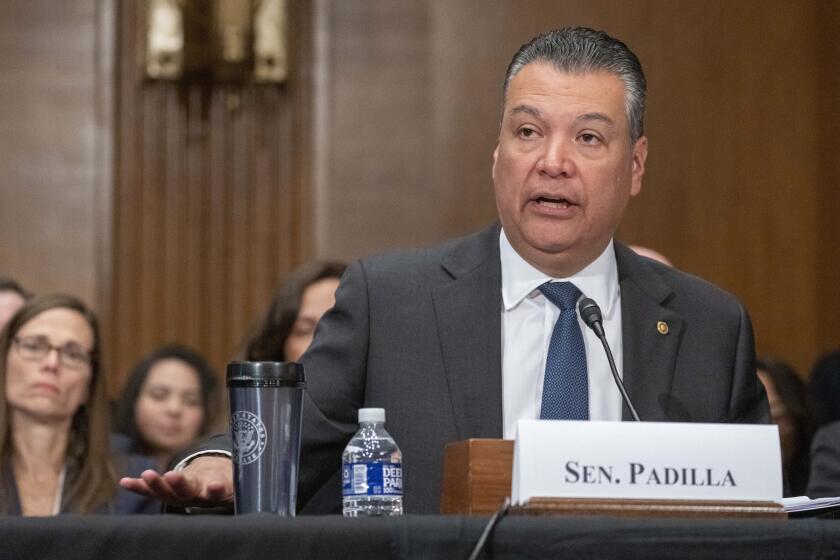Senate Republicans block bipartisan border package, scuttling deal they had demanded from Democrats

- Share via
WASHINGTON — Senate Republicans blocked a bipartisan border package Wednesday, scuttling months of negotiations with Democrats on legislation intended to cut back record numbers of illegal border crossings.
Many Republicans said the election-year compromise wasn’t enough, even as supporters of the bill insisted it was the best possible in a divided government.
The 49-50 vote, far short of the 60 ayes needed to take up the bill, came after most Republicans said they would vote against the legislation, which also includes $60 billion in wartime aid to Ukraine and $14 billion for Israel and was backed by President Biden. GOP lawmakers had insisted that the money for conflicts abroad be paired with help for the U.S. border.
Forcing the showdown with Republicans, Senate Majority Leader Charles E. Schumer (D-N.Y.) said earlier that he would try to salvage the wartime funding, and would next push ahead on a crucial test vote for tens of billions of dollars for Ukraine, Israel and other U.S. allies — a package with the border portion stripped out.
The bipartisan group of senators who negotiated the compromise for the last four months said it was a missed opportunity to try to make some progress toward one of the most intractable issues in American politics.
Senators have come out with a $118-billion compromise that pairs tens of billions of dollars in wartime aid for Ukraine with new border laws
In a speech on the Senate floor just before the vote, Republican Sen. James Lankford of Oklahoma said it was a chance for the Senate to decide “if we’re going to do nothing, or something.”
“It’s an issue that’s bedeviled, quite frankly, this body for decades,” Lankford said. “It’s been three decades since we’ve passed anything into law to be able to change border security.”
Independent Sen. Kyrsten Sinema of Arizona blamed Republicans for not giving the bill a chance.
“Finally, it seemed, we had the opportunity to solve the nightmare my state has lived for over 40 years,” she said.
Four Republicans voted to move forward with the legislation and six Democrats voted against it, some of whom said the border compromise went too far.
Padilla says border state Democrats weren’t part of negotiating the immigration bill, which he says makes extreme changes to the asylum process.
It is unclear whether enough Republicans will vote to move ahead with the stand-alone legislation for the wartime aid, which also would need 60 votes in the Senate. If it did pass, it would still take days for the Senate to reach a final vote.
As some Republicans have grown skeptical of sending money to Ukraine in its war with Russia, Schumer said that “history will cast a permanent and shameful shadow” on those who attempt to block it.
“Will the Senate stand up to brutish thugs like Vladimir Putin and reassure our friends abroad that America will never abandon them in the hour of need?” Schumer asked as he opened the Senate.
The roughly $60 billion in Ukraine aid has been stalled in Congress for months because of growing opposition from hard-line conservatives in the House and Senate who criticize it as wasteful and demand an exit strategy for the war.
“We still need to secure America’s borders before sending another dime overseas,” Republican Sen. Mike Lee of Utah wrote in a post on X.
The impasse means that the U.S. has halted arms shipments to Kyiv at a crucial point in the nearly two-year-old conflict, leaving Ukrainian soldiers without ample ammunition and missiles as Russian President Vladimir Putin has mounted relentless attacks.
Ukraine’s cause still enjoys support from many Senate Republicans, including Minority Leader Mitch McConnell of Kentucky, but the question vexing lawmakers has always been how to craft a package that could clear the Republican-controlled House.
A pairing of border policies and aid for allies — first proposed by Republicans — was intended to help squeeze the package through the House, where archconservatives hold control. But GOP senators — some within minutes of the bill’s release Sunday — rejected the compromise as election-year politics.
The wartime funding also would invest in domestic defense manufacturing, send funding to allies in Asia and provide $10 billion for humanitarian efforts in Ukraine, Israel, Gaza and other places.
Schumer said the revamped package would include legislation to authorize sanctions and anti-money-laundering tools against criminal enterprises that traffic fentanyl into the U.S. A separate section of the compromise border legislation that would have provided a long-awaited pathway to residency for tens of thousands of Afghan refugees was dropped in the slimmed-down bill.
It was unclear whether the new plan, even if it passed the Senate, would gain support from House Speaker Mike Johnson. House Republicans are still insisting on a border plan, even though they rejected the deal negotiated in the Senate as insufficient.
“We’ll see what the Senate does,” Johnson (R-La.) told reporters Wednesday morning. “We’re going to allow the process to play out.”
Some were skeptical that a stand-alone aid package would be viable in the House.
“I don’t see how that moves in this chamber. I don’t know how the speaker puts that on the floor,” House Armed Services Committee Chairman Mike D. Rogers (R-Ala.) said, adding that he still wanted tougher border policies attached.
After Donald Trump, the leading Republican presidential candidate, denounced the Senate’s bipartisan border proposal, Johnson quickly rejected it. Trump has also led many Republicans to question supporting Ukraine, suggesting he could negotiate an end to the war and lavishing praise on Putin, including after Moscow’s February 2022 invasion of Ukraine.
Johnson said this week he wanted to handle wartime aid for Israel and Ukraine in separate packages, but a bill he advanced that included only funds for Israel failed on the House floor Tuesday night.
House Minority Leader Hakeem Jeffries (D-N.Y.) said Wednesday that the “only path forward” is a comprehensive approach that includes funding for U.S. allies around the world, as well as humanitarian support for civilians caught in conflicts in Gaza and Ukraine.
The White House said Biden believes there should be new border policy but would also support moving the aid for Ukraine and Israel alone, as he has from the start.
“We support this bill which would protect America’s national security interests by stopping Putin’s onslaught in Ukraine before he turns to other countries, helping Israel defend itself against Hamas terrorists and delivering lifesaving humanitarian aid to innocent Palestinian civilians,” White House Deputy Press Secretary Andrew Bates said.
“Even if some congressional Republicans’ commitment to border security hinges on politics, President Biden’s does not.”
Associated Press writer Seung Min Kim contributed to this report.
More to Read
Get the L.A. Times Politics newsletter
Deeply reported insights into legislation, politics and policy from Sacramento, Washington and beyond. In your inbox twice per week.
You may occasionally receive promotional content from the Los Angeles Times.












